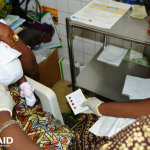
Growing up in farming families in northern Côte d’Ivoire, childhood friends Coulibaly Zana Sina and Justin Ake Koffi remember when cashew trees were worth so little that they used them to fence their fields growing more profitable crops like mango and maize.
While scouting locations for his new apparel factory, Aka Phillippe Kouame settled on Abobo, an Abidjan neighborhood that had been ravaged during Côte d’Ivoire’s civil war, for reasons that might have caused others to reject it. Unemployment was high there, and banditry and robbery were on the rise.

On March 9, Adèle*, 39, and her 6-week-old baby come to Abobo General Hospital, located in the north of Abidjan, Côte d’Ivoire’s capital city, for a postnatal care checkup. Dried blood spots are collected from the baby’s heel for an HIV PCR (polymerase chain reaction) test, a routine test for all babies born to HIV-positive mothers. The test ensures early diagnosis of HIV infection to improve the survival and quality of life of HIV-exposed babies.

For a long period, residents of Côte d’Ivoire’s city of Dimbokro, as in most cities in the country, lacked trust in the justice system. In fact, the entire justice system was perceived as inefficient, unfair and slow to act.

Election periods often have the potential to stoke tension and threaten social cohesion. Rising tension can sometimes spill over into outbreaks of violence, as Côte d'Ivoire experienced in 2010 before, during and after the polls.








Comment
Make a general inquiry or suggest an improvement.